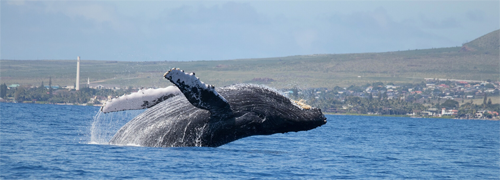Whales in Hawaii
 | ||||
The Majestic Whales of Hawaii: A Journey to the Pacific Paradise ~
Hawaii, the Aloha State, is renowned for its stunning natural beauty, rich culture, and warm hospitality. But beneath the waves of its crystal-clear oceans, a majestic spectacle awaits – the humpback whales. Each year, these gentle giants migrate to Hawaii's shores, drawing visitors from around the world to witness their breathtaking displays.
The Humpback Whale Migration ~
Humpback whales embark on an incredible journey, traveling over 3,000 miles from Alaska's icy waters to Hawaii's tropical paradise. This arduous migration, one of the longest of any mammal, is driven by the quest for food, shelter, and love. As the whales escape the harsh Arctic climate, they seek the warmth and abundance of Hawaii's oceans, where they can mate, give birth, and nurse their young.
The Science Behind the Migration ~
Scientists have long been fascinated by the humpback whales' remarkable migration. Research has revealed that these intelligent creatures use a complex system of navigation, relying on celestial cues, magnetic fields, and even the Earth's topography to guide their journey. Their remarkable memory and social bonds also play a crucial role, as they return to the same breeding grounds and feeding areas year after year.
The Whale Watching Experience ~
As the whales arrive in Hawaii, they bring with them a spectacle like no other. Visitors flock to the shores, eager to catch a glimpse of these majestic creatures. Whale watching tours offer a unique opportunity to observe the whales up close, as they breach, feed, and socialize in their natural habitat. The experience is both exhilarating and humbling, as one witnesses the sheer power and grace of these gentle giants.
Conservation Efforts ~
However, the humpback whales' migration is not without its challenges. Climate change, pollution, and overfishing threaten their very existence. Conservation efforts are crucial to protect their habitats and ensure their survival. In Hawaii, organizations like the National Oceanic and Atmospheric Administration (NOAA) and the Hawaiian Islands Humpback Whale National Marine Sanctuary work tirelessly to monitor and protect the whales.
Threats and Challenges ~
Despite these efforts, the humpback whales face numerous threats. Climate change affects their food supply, as warmer waters alter the distribution of krill and other prey. Pollution, including plastic waste and noise pollution from human activities, also poses a significant risk. Overfishing and habitat destruction further exacerbate the challenges facing these magnificent creatures.
Cultural Significance ~
In Hawaiian culture, the humpback whales hold a revered place. Ancient Hawaiians believed the whales were sacred, associating them with the god Kanaloa, who protected the ocean and its creatures. Today, the whales continue to inspire and educate, serving as a reminder of our responsibility to protect the natural world.
Conclusion ~
The humpback whales of Hawaii are a treasure, a reminder of the beauty and wonder of the natural world. As we marvel at their majesty, we must also acknowledge our responsibility to protect them and their habitat. Through conservation efforts and sustainable practices, we can ensure the survival of these incredible creatures, preserving the magic of Hawaii's oceans for generations to come.

For getting around Hawaii a rental car is highly suggested! Hawaiicarrental.com is the right place to book. A rental car gives you the ability to explore the islands in Hawaii beyond the main tourist areas, discovering hidden waterfalls, hiking trails, and local towns.
